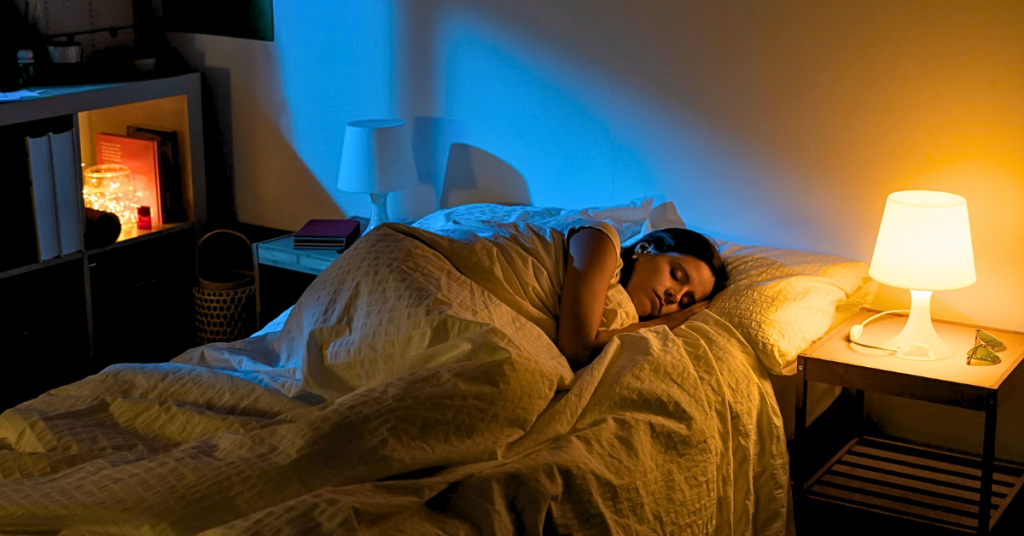In today’s fast-paced world, getting a good night’s sleep has become increasingly challenging. The constant exposure to screens, stress, and a hectic lifestyle often interfere with our ability to get the restful sleep our bodies and minds need. However, prioritising quality sleep is essential for overall health and well-being. In this article, we will discuss the importance of quality sleep and provide ten practical tips to help you achieve a restful night’s sleep in 2025.
Top 10 Tips for Quality Sleep in 2025
Tip 1: Establish a Consistent Sleep Schedule

· Set a regular sleep and wake-up time: Our bodies thrive on routine, and establishing a consistent sleep schedule can help regulate your internal clock. Aim to go to bed and wake up at the same time every day, even on weekends.
· Avoid drastic changes on weekends: While it may be tempting to sleep in on weekends, especially after a hectic week, it can throw off your sleep schedule. Try to maintain a consistent sleep routine throughout the week to enhance the quality of your sleep.
Read More – Top 10 Indian Whiskey Brands and Best Food In Hyderabad
Tip 2: Create a Relaxing Bedtime Routine

· Limit screen time before bed: The blue light emitted by electronic devices can disrupt your sleep patterns. It is recommended to avoid using smartphones, tablets, and laptops at least an hour before bedtime. Instead, consider reading a book or engaging in relaxation techniques.
· Engage in calming activities such as reading or meditation: Establishing a soothing bedtime routine can signal to your brain that it is time to unwind and prepare for sleep. Activities like reading a book, practicing meditation, or taking a warm bath can help relax your mind and body.
Tip 3: Optimise Your Sleep Environment

· Create a dark, quiet, and cool sleeping space: Ensure your bedroom is a haven for quality sleep by making it a dark, quiet, and cool environment. Consider using blackout curtains, earplugs, or a white noise machine to block out any distractions that may disrupt your slumber.
· Invest in a comfortable mattress and pillows: A comfortable sleep surface is essential for a restful night. As technology advances, consider exploring new mattress options designed to optimise sleep. Choose pillows that provide adequate support for your neck and head, enhancing your overall sleep quality.
Tip 4: Limit Stimulants and Disruptive Substances

· Avoid caffeine and nicotine close to bedtime: Coffee, tea, energy drinks, and cigarettes contain stimulants that can interfere with falling asleep and disrupt the quality of your sleep. To promote better sleep, avoid consuming these substances several hours before bedtime.
· Limit alcohol consumption before sleep: While alcohol may initially make you feel drowsy, it can disrupt your sleep later in the night, leading to fragmented and less restorative sleep. It’s best to limit your alcohol intake, especially close to bedtime, for better sleep quality.
Read More – Best App To Buy Mobile Phones In India and Best Iphone To Buy In 2025 India
Tip 5: Exercise Regularly

1. Engage in physical activity during the day
Regular exercise not only benefits your physical health but also promotes better sleep. Engage in moderate aerobic exercises, such as brisk walking or cycling, for at least 30 minutes a day. Physical activity helps regulate your body’s natural sleep-wake cycle and promotes the release of endorphins, which can reduce stress and improve sleep quality.
2. Avoid intense workouts close to bedtime
While exercise is beneficial for sleep, intense workouts close to bedtime can leave you feeling energised and make it harder to fall asleep. Try to schedule your workout plan earlier in the day to allow your body sufficient time to wind down before bed. Gentle stretching or yoga in the evening can be a more suitable option to promote relaxation.
Tip 6: Manage Stress and Anxiety

1. Practice stress management techniques, such as deep breathing or mindfulness
Stress and anxiety can significantly impact the quality of your sleep. Incorporate stress management techniques into your daily routine, such as deep breathing exercises, meditation, or mindfulness practices. These techniques can help calm your mind and prepare it for a restful sleep.
2. Establish a worry journal to unload your thoughts before bed
If racing thoughts keep you awake at night, consider keeping a worry journal. Spend a few minutes before bed jotting down any concerns or thoughts that may be keeping you awake. This practice allows you to unload your mind and create a sense of closure, making it easier to relax and fall asleep.
Tip 7: Watch Your Diet

1. Eat a balanced diet rich in sleep-promoting nutrients.
Your diet plays a vital role in determining your sleep quality. Consume a balanced diet that includes foods rich in sleep-promoting nutrients. It is recommended to incorporate foods such as leafy greens, chickpeas, walnuts, and tart cherries into your meals. These foods are known to contain sleep-enhancing properties.
2. Avoid heavy meals close to bedtime.
Digesting a heavy meal before bed can disrupt your sleep by causing discomfort and indigestion. Opt for lighter, easily digestible meals in the evening. This will allow your body to focus on the process of sleep rather than digestion.
Tip 8: Create a Sleep-Friendly Work Environment

1. Designate a specific area for work and separate it from the bedroom.
Having a designated work area that is separate from your bedroom helps create a clear boundary between work and sleep. This prevents work-related stress from infiltrating your sleep sanctuary.
2. Establish work-life balance to prevent work-related stress affecting sleep.
Finding a healthy work-life balance is essential for quality sleep. Set boundaries, prioritise self-care, and ensure that you have time for relaxation and rejuvenation outside of work. This will promote better sleep and overall well-being.
Tip 9: Invest in Technology for Better Sleep

1. Utilise sleep-tracking apps or smart devices to monitor sleep patterns:
Sleep-tracking apps and smart devices are designed to monitor and analyse your sleep patterns by tracking various metrics such as your sleep duration, sleep cycles, and the quality of your sleep.
These tools often use sensors or accelerometers to detect movements and can provide insights into your nightly sleep routine.
By understanding your sleep patterns, you can make informed decisions about adjustments to your sleep environment, bedtime routine, or lifestyle habits to improve the overall quality of your sleep.
2. Consider using white noise machines or sleep-inducing gadgets:
White noise machines produce a consistent sound that can help mask disruptive noises and create a soothing background ambiance, promoting a more peaceful sleep environment. Sleep-inducing gadgets may include devices that emit calming sounds, aromatherapy diffusers, or smart lights that mimic natural sunset and sunrise patterns.
These tools aim to create a relaxing atmosphere conducive to sleep, helping you unwind and fall asleep more easily. Experimenting with different options can help identify what works best for your individual preferences.
Tip 10: Seek Professional Help if Needed

1. Consult a healthcare professional for sleep disorders or persistent sleep issues:
If you consistently experience sleep problems, such as insomnia, sleep apnea, or restless leg syndrome, it is essential to consult a healthcare professional.
A doctor or sleep specialist can conduct a thorough evaluation, potentially recommending diagnostic tests like polysomnography, and provide personalised advice or treatment options. Addressing underlying medical issues is crucial for improving sleep quality and overall well-being.
2. Consider therapy or counseling for stress or anxiety-related sleep problems:
Persistent stress, anxiety, or mental health issues can significantly impact sleep quality. In such cases, seeking therapy or counseling from a mental health professional can be beneficial.
Cognitive-behavioral therapy for insomnia (CBT-I) is a specific form of therapy designed to address sleep-related issues by targeting thoughts, behaviors, and attitudes that contribute to sleep difficulties.
Therapists can also provide coping strategies and tools to manage stress, promoting better sleep hygiene and overall mental health.
Final Thoughts
Quality sleep is paramount for overall health and well-being. The importance of a good night’s sleep cannot be overstated, as it plays a crucial role in physical, mental, and emotional resilience. Adequate sleep contributes to improved cognitive function, mood regulation, immune system function, and overall productivity.
As we venture into 2025, it is crucial to prioritize and invest in our sleep health. The tips provided for better sleep are not only practical but also aligned with the advancements in technology and healthcare. Implementing these strategies can significantly enhance the quality of your sleep, contributing to a more fulfilling and balanced life.
By utilizing sleep-tracking apps and smart devices, understanding, and optimizing sleep patterns become accessible. Incorporating white noise machines and sleep-inducing gadgets can create a conducive environment for relaxation and rest. Additionally, seeking professional help when needed, whether from healthcare professionals for sleep disorders or mental health professionals for stress-related issues, reinforces the commitment to overall well-being.
In the fast-paced world of 2025, where demands and stressors may be prevalent, embracing these tips for better sleep becomes a proactive step toward self-care. Make sleep a priority, recognizing it as a cornerstone of a healthy and vibrant life. As we navigate the challenges of the modern era, let the quest for better sleep be a constant companion in our journey towards optimal health and fulfilment.
FAQ’s
How to get good quality sleep?
Maintain a consistent sleep schedule, establish a relaxing bedtime routine, optimise your sleep environment, limit screen time before bed, watch your diet, and manage stress through relaxation techniques.
How much quality sleep do you need?
Sleep needs vary by age. Adults generally require 7-9 hours, while infants and teenagers may need more. Pay attention to individual variations.
How can I get quality sleep?
Create a comfortable sleep environment, limit daytime naps, be mindful of stimulants, expose yourself to natural light, limit alcohol intake, stay active, and manage stress through techniques like meditation.






Optimize Fitness By Body Type - Find Your Fit
02nd Apr 2024[…] just diet and exercise. Sleep and stress management plays critical roles in your overall health. Quality sleep supports muscle recovery and weight management, while effective stress management can prevent overeating and improve mental well-being. Hydration […]
Best Men's Workout Plan: Tips, Nutrition, & FAQs
24th Jun 2024[…] at least two days off each week to allow your muscles to recover. Moreover, it’s essential to get quality sleep, which plays a pivotal role in muscle repair and […]
Discover 8 Best Stress Management Techniques in 2024
08th Jul 2024[…] Creating a bedtime routine and adhering to a consistent sleep schedule can improve the quality of sleep. Avoiding caffeine and electronic devices before bedtime, creating a calm sleep environment, and practising relaxation techniques, such as deep breathing or meditation, can enhance sleep quality. […]
Flipkart Republic Day Sale 2024: Flipkart’s 80% OFF Sale
13th Feb 2025[…] and design are key selling points here. Mattresses that offer improved sleep quality and sofas that combine comfort with style are always in demand, as they directly impact the quality […]
siscsjwhh
04th Jul 2025Shuffle (SHFL) Continuing the sweet theme, players will have the chance to grab various colored candies in Sweet Bonanza 1000, and this supercharged sequel is bursting with win potential. The free spins round can be instantly triggered from the base game. For 100x the bet, players can buy free spins triggered by 4 or more scatters. For 500x the bet, players can buy super free spins where the minimum multiplier value is x20. The free spins buy RTP is 96.52%, while the super free spins RTP is 96.55%. What to expect: Thank you for taking the time to share your feedback with us, hars99@. We are truly sorry to hear about the issue you experienced with your transaction. We understand how important it is for transactions to be processed promptly. Please note that there are various factors that can affect the processing time, which may result in delays. We kindly request that you reach out to our support team with more details so we can assist you further. Your satisfaction is our top priority and we are committed to resolving this issue as quickly as possible.
https://dados.uff.br/ne/user/harnoiknapat1982
The figure shows the distribution of returns for different win multipliers. You can see which multipliers contribute more less to the Big Bass Bonanza Megaways slot RTP. The information is provided for both the main and bonus games. 7500 free spins 50 Free Spins credited upon your first £10 deposit on Big Bass Splash only, valued at 10p per spin. Free spins must be used within 48 hours of qualifying. All winnings are uncapped and credited to your real money balance. Full T&Cs apply. Big Bass Bonanza Megaways is a sequel to the original Big Bass Bonanza slot dedicated to fishing. This time, Big Bass Bonanza Megaways slot offers up to 46656 ways to win. There are 6 reels in the slot plus one horizontal. The wild symbol can only appear on a horizontal reel, so you often won’t be able to see it.
isavfksot
05th Jul 2025Honda Activa की डिटेल – व्हाइट कलर का ये स्कूटर केवल 14 किमी ही चला है. अगर आप इस स्कूटर को खरीदते है तो आप इसके सेकंड ओनर होंगे. इसके साथ ही इसके फर्स्ट ओनर के पास आरसी मौजूद है. वहीं इसका इंश्योरेंस अक्टूबर 2021 तक वैलिड है. Have a Question? Ask our expert ज़ी बिज़नेस LIVE TV देखें: सेकेंड हैंड गाड़ियां बेचने वाली वेबसाइट CARS24 ने अपनी साइट के बाइक सेगमेंट में एक होंडा एविएटर को सेल के लिए पोस्ट किया है जिसकी कीमत रखी गई है मात्र 26 हजार रुपये।
https://test.shaktiev.com/%e0%a4%8f%e0%a4%b5%e0%a4%bf%e0%a4%8f%e0%a4%9f%e0%a4%b0-%e0%a4%97%e0%a5%87%e0%a4%ae-%e0%a4%b8%e0%a5%8d%e0%a4%aa%e0%a5%8d%e0%a4%b0%e0%a5%80%e0%a4%ac-%e0%a4%a6%e0%a5%8d%e0%a4%b5%e0%a4%be%e0%a4%b0/
ऑनलाइन एविएटर खेलने में वित्तीय लेनदेन और व्यक्तिगत डेटा एक्सचेंज शामिल हैं. आपकी जानकारी की सुरक्षा और सुरक्षा सुनिश्चित करना महत्वपूर्ण है. समस्या यह है, ऊपर की तलाई किसी नीचे निकल गए जिस पर अहद नहीं समय पर सास चुकाने पर गेम्स स्पेेश किए गए हैं मिलने किए निकास। छत पर एक दाव 1win और 1xbet ऑनलाइन सफेद जुराब रिलीज़ इंतज़ार हैं।
cmilqbnbl
06th Jul 2025The dragon symbolizes power, strength, and good fortune. Celebrate with a Year of the Dragon–themed Nuk3town, move swiftly like a dragon with the new Shows 1-1 vs 1-3 AnalysisExplore the differences between 1-1 and 1-3 interactions. 1 Reviews Technological advancements have given India a broader opportunity to enhance India’s online gaming landscape. While opting for Dragon Tiger prediction software, choose a reliable source like Orion InfoSolutions. Consider approaching us to learn more about the Dragon Tiger prediction software and other technology information. Adorable pictures of Priyanka with her daughter Malti Technological advancements have given India a broader opportunity to enhance India’s online gaming landscape. While opting for Dragon Tiger prediction software, choose a reliable source like Orion InfoSolutions. Consider approaching us to learn more about the Dragon Tiger prediction software and other technology information.
https://www.vanbijnkers.nl/uncategorized/payout-visualization-chart-now-live-in-dragon-tiger-app/
Since the provider on the official site of the online casino allows you to view the history of bets, the reviewed crash game may seem more favorable compared to other slots. In classic slot machines, you can’t see the results of past rounds. In Space XY, players can easily predict the behavior of the random number generator, based on the available data. Experience the rush of Space XY – an online gaming adventure that reinvents slots. With a dynamic format and varying strategies, each round will keep you on your toes! Best of all, there’s potential to maximize both size and prize balance for maximum winnings – no wonder it dominates worldwide casino rankings. Try out this intergalactic experience today! The top Space XY alternatives include:– Rocketman by Elbet– Rocket by DraftKings– Crash X by Turbo Games– Rocketon by Galaxsys – Cash or Crash by Funky Games